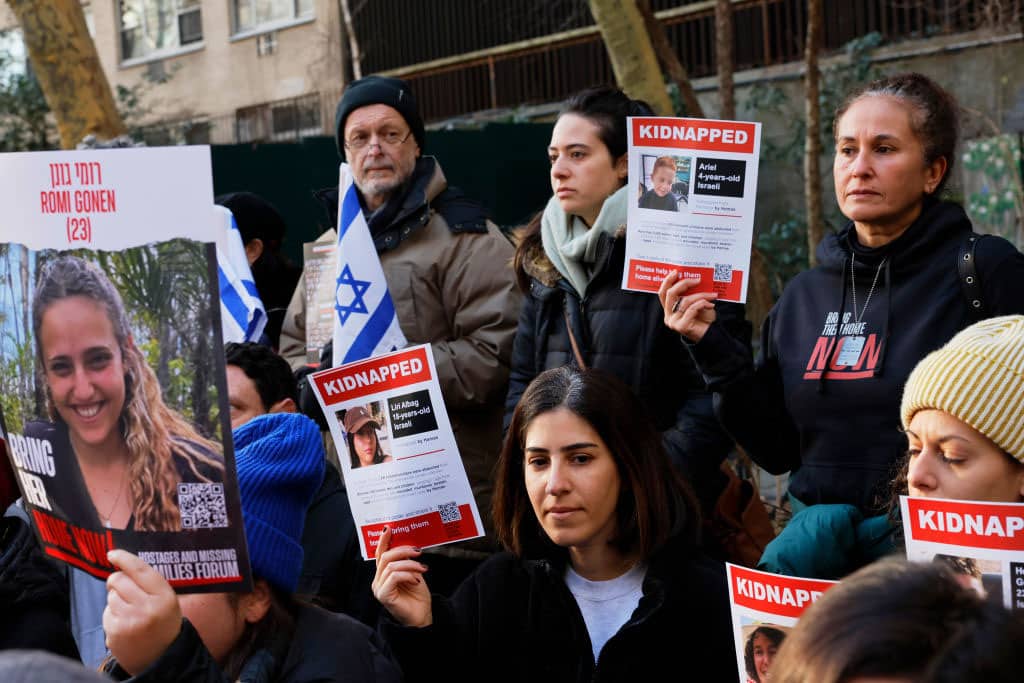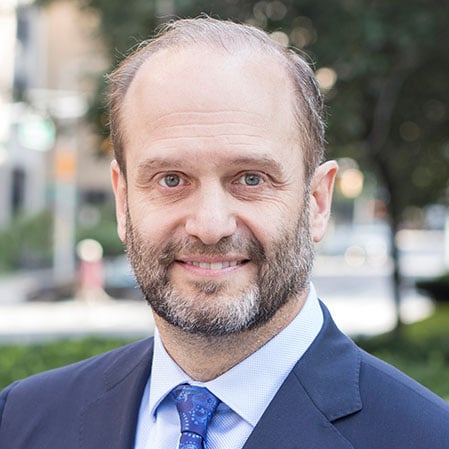 People attend a rally for the release of the hostages kidnapped by Hamas at Dag Hammarskjold Plaza near the UN Headquarters on January 12, 2024 in New York City. (Photo by Michael M. Santiago/Getty Images)
People attend a rally for the release of the hostages kidnapped by Hamas at Dag Hammarskjold Plaza near the UN Headquarters on January 12, 2024 in New York City. (Photo by Michael M. Santiago/Getty Images) One could call this the Gettysburg Address of the Exodus. At the beginning of Parshat Vaera, God speaks to Moses and assures him that slavery is about to come to an end:
“Therefore say to the children of Israel: ‘I am the Lord; I will bring you out from under the burdens of the Egyptians, I will rescue you from their bondage, and I will redeem you with an outstretched arm and with great judgments. I will take you as My people, and I will be your God. Then you shall know that I am the Lord your God who brings you out from under the burdens of the Egyptians. And I will bring you into the land which I swore to give to Abraham, Isaac, and Jacob; and I will give it to you as a heritage..” (Exodus 6:6-8.)
In just a few sentences, the Torah gives us an overview of the full process of redemption; not just an escape from slavery, but the creation of a new nation with a homeland of their own. The Talmud refers to the first four verbs in this section, (bring out, rescue, redeem, and take,) as the “four languages of redemption”; And to this day, the four cups of wine at Passover Seder are in celebration of these words.
The parsha begins with this speech, most probably in order to begin on a high point. But it also begins mid-conversation, which strips it of context. God’s words are actually a response to an angry challenge by Moses; after his initial petition to Pharaoh backfires, and causes even greater pain to the slaves, Moses turns to God and says: “Lord, why have you done such evil to this nation? Why is it that You have sent me?”
Moses’ words border on the sacrilegious. Indeed, several commentaries criticize Moses for this. Rashi says that God, in his response, subtly rebukes Moses for his complaint; one Midrash says Moses was later punished for challenging God, and not allowed to enter Israel.
Yet the simple reading of God’s response is that He takes Moses’ challenge seriously; that is why God offers such a thorough and detailed reply. Moses is speaking on behalf of those who are oppressed and downtrodden, and even if he speaks with chutzpah, he does so out of love for his Jewish brothers and sisters.
Another Midrash (Shemot Rabbah 5:22) amplifies Moses’ complaint. Moses knows the Jews will eventually be rescued, but he cannot tolerate the delay. A future redemption, Moses says, will not “help the Jews who are now being thrown under the building.” This curious phrase refers to a shocking image found in Rabbinic literature (Midrash Zuta Kohelet 7:7, Rashi Sanhedrin 111a) that in the Egyptian construction projects of Pithom and Raamses, Jews were used as bricks, and squeezed into the gaps of walls. A similar Midrash (2:24) asserts Pharaoh sought to heal himself of leprosy by bathing in the blood of 150 murdered Jewish children each morning and evening.
These midrashic images amplify the biblical text, which talks at length about Pharaoh’s attempts to kill Jewish children. But they are not here just to vilify Pharaoh; they come to expose the inner workings of his regime.
Some acts of hatred are utilitarian; one feels threatened, and therefore needs to fight an enemy. But other times, hatred stands at the very foundation of a society. The historian Saul Friedlander coined the term “redemptive antisemitism,” to describe the Nazi hatred of Jews. The Nazis saw Jews as a virus that weakens and undermines humanity; the destruction of the Jews would bring goodness to the rest of the world.
These midrashim are articulating something similar. In one, the murder of Jewish children is seen as therapeutic, a way for Pharaoh to recover his health. In the other, dead Jews are the foundation of Egyptian development. For Pharaoh, killing is no longer the means of maintaining power, but the very purpose of power itself. Violence against Jews is the scaffolding that holds his regime together.
Unfortunately, these Midrashim are prescient, offering a clear description of Hamas. There are no limits to Hamas’ “100-year war.” It engaged in a premeditated mass murder in the most horrible, depraved fashion, all proudly recorded by terrorists on their body cameras. Even more shocking is Hamas’ overt contempt for the very people they claim to represent. Palestinians were Hamas’ first victims, as this autocratic regime has regularly murdered its opponents. Today, Palestinians are enduring great suffering because Hamas cynically uses civilians as human shields, and calculates the strategic value of their deaths. Hamas will have the Palestinians fight to the death in Gaza while many of its leaders sit comfortably in Doha.
Supporters of Israel are sometimes reluctant to speak about the tragedy of Palestinian civilians because it has been weaponized by Hamas and its enablers; as I write these words, the International Court of Justice is presiding over a South African claim that Israel has engaged in “genocide.” But even so, we must mourn for the deaths of those caught in the crossfire. Every human being is created in the image of God.
Hamas has built its regime with the blood of both Palestinians and Israelis. Its great construction project, the Gaza tunnels, is built for death, and by death. Hamas’ wanton violence may shock us; but the Midrash predicted this type of hatred hundreds of years ago.
Like Moses, we are anguished over the innocent babies who were massacred, and mourn for those who were brutally murdered. Israel has had to send its best and brightest out to take up the fight; and too many of them have fallen in battle. For all of these tragedies, we cry.
Every death is a profound loss; but the death of a young person is all the more painful because it is so unexpected. In the ordinary way of the world, children bury their parents, not the other way around. My father died in a car accident, predeceasing my grandfather by nearly 40 years. My grandfather was a jovial man, who always had a smile on his face; that is, except when he spoke about my father. Then the smile left his face; even decades later, the grief would quickly return. No suffering is greater than that of losing a child.
A Hebrew expression, which is first found in Isaiah (38:10), best describes a young death: “nektaph b’mei chayav,” “cut off in the middle of their days.” It emphasizes that a young death is actually a double tragedy; one loses not just the person, but also what the person could have been.
Each of these deaths are painful for our entire community. News reports out of Israel recount the entire biography of those who have died; the entire Jewish world repeats their names and their stories. And inevitably, we find that we are one or two degrees of separation from these tragedies.
Hamas sees our response as a weakness. Yahya Sinwar sees the Israeli concern for each hostage and each soldier to be a weakness; he considers his ability to write off the lives of thousands of Palestinians to be a strength. He ridicules Israel’s willingness to call a ceasefire in order to release a handful of hostages. Like Pharaoh, Sinwar is ready to build pyramids with the bodies of babies.
Sinwar is correct that brutality holds strategic value; ignoring the suffering of one’s own people means that one can fight on without any limitations. But it is morally untenable. Moses cried for the babies Pharaoh was murdering, and we must follow his example.
Even if it seems foolish, we must advocate for each hostage, and cry for every soldier.
We must never forget them. And we must challenge God to remember them, and put an end to the suffering now.
Rabbi Chaim Steinmetz is the Senior Rabbi of Congregation Kehilath Jeshurun in New York.






















 More news and opinions than at a Shabbat dinner, right in your inbox.
More news and opinions than at a Shabbat dinner, right in your inbox.